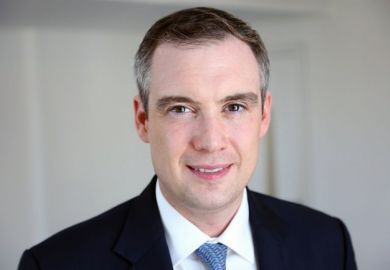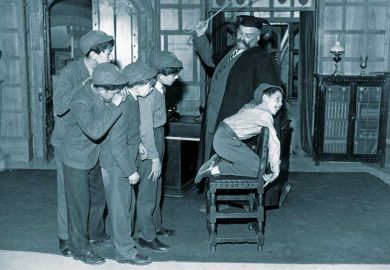The end of March was perhaps the end of the beginning for the Office for Students, which had become the English sector regulator two years previously. The OfS’ first chair, Sir Michael Barber, the former head of Tony Blair’s Delivery Unit, who has also advised governments from Canada to Australia to Pakistan on achieving their goals, left the regulator at the end of his term of office on 31 March.
Some vice-chancellors have deep misgivings about the path taken by the OfS, created by Conservative former universities minister Jo Johnson in the belief that a funding system based largely on students’ tuition fees required a market-style regulator with far-reaching new powers to protect students as consumers and drive competition. Sir Michael’s exit offers a chance to weigh up the OfS’ record and future.
And the Barberist “deliverology” deployed at the OfS might be going more mainstream: the day after his exit from the regulator saw the publication of his new book, Accomplishment: How to Achieve Ambitious and Challenging Things. The book is billed as applying delivery expertise to “any area of life”, whether readers want to “run a marathon, transform a school or provide a public service to millions”, drawing management self-help tips from fields ranging from government to cycling (there is a lot of cycling). Sir Michael interviews figures including England football manager Gareth Southgate, who discusses preparing the team to win a penalty shoot-out through planning that involved pasting information on opposition penalty-takers on to goalkeeper Jordan Pickford’s water bottle, and University of Oxford biochemistry professor Jane Mellor, who talks about going into the lab “with an open mind every day”.
Plus, now he has left the OfS, Sir Michael starts another big project, having been asked by prime minister Boris Johnson to lead “a rapid review of the arrangements for driving and monitoring delivery” in government. The end of his time at the OfS may not be the end of his influence on universities.
What have his big accomplishments at the OfS been?
After referring to a “team effort” at the regulator and the fact the accomplishments come from people in higher education, Sir Michael highlighted an interview in his book with former Mozambique prime minister Luísa Diogo, who describes the role of government as being to release “the music in each person”.
He continued: “One of the things when you’re a regulator is to think, how do you unlock the music in institutions and people? The thing I’m most proud of that the OfS has done, with enthusiastic response in general from the higher education system, is the progress on access and participation. What universities are planning to do and the willingness to set some ambitious goals, to keep at it through the pandemic…I think is really impressive.”
The OfS has required universities to set longer-term access plans of between three and five years, with England’s most selective universities required to eliminate the gap in entry rates between the most and the least disadvantaged applicants by the end of 2038-39.
Sir Michael said: “We’ve created the framework and universities and higher education institutions have put in place the opportunity to bring about massive progress in social mobility that we haven’t seen for a long time in higher education, or in society more generally.”
Since the OfS was created, there have been “four different higher education ministers, three different secretaries of state, three chancellors of the Exchequer, two prime ministers”, Sir Michael noted. In “a period of uncertainty, getting a regulator that is respected and effective is an achievement”, he added. “Again, not mine alone – the board is good and the executive team is outstanding.”
While the OfS’ predecessor body, the Higher Education Funding Council for England (Hefce), was often described as a “buffer” between government and universities, some vice-chancellors question whether the OfS can really be described as an independent regulator. They highlight the OfS’ plans on quality and standards, which involve judging institutions’ courses on an absolute baseline of the proportions of students going into “managerial and professional” jobs, as an example of the regulator appearing to implement the government’s wishes.
The OfS was “never constituted, and nor was Hefce for that matter, to be totally independent of government”, said Sir Michael, noting that its chair, chief executive and board are “appointed ultimately by the secretary of state”.
He continued: “This is what I always say when I talk to vice-chancellors: when you [are chairing a regulator] – or if you’re me and you’re chairing a regulator – your independence isn’t something you maintain by picking fights in public…You actually do want a good working relationship with government. The fact I choose to argue with government behind the scenes in a thoughtful, vigorous – often – way, that’s my choice.”
He has pushed back against the government?
“We had a very clear strategy and where the government is asking us to do things that conflict with that, we might well debate that with them,” Sir Michael replied. “But overall, by the way, it’s easier when lots of what the government is doing you want to do anyway.”
Some in the sector feel that far from “unlocking the music” in universities, the regulator’s tone with universities has hit all the wrong notes, possibly in the wrong order, too, particularly as they wrestled with the pandemic. The phrase “universities must…” is an OfS favourite.
Sir Michael said: “Periodically, we’re not always going to get the tone exactly right. But overall, we’ve done very well on that. When you’re a regulator you don’t want to be chummy and totally captured by the sector you are regulating.”
He continued: “I think we’ve done really well in responding to the huge transformation that occurred this time last year [with the pandemic], working with government to get some of the rescue packages in place, working with the sector to go through that.”
University leaders have done a “remarkable job” in the pandemic, while students have been “very resilient”, Sir Michael added.
On his book, he said it came about as “the more I read and more I talked to people who led sports teams, [to] businesspeople and academics, the more I saw a pattern of accomplishment – it attracted me to try to spell that out”. Sir Michael already knew Gareth Southgate, having been a member of the Football Association’s technical advisory board, and saw the penalty shoot-out planning as significant, as it “rippled through the whole way the [England] squad responded to the management, because they saw the attention to detail and the thoroughness with which Gareth and his team went about it”.
On his review for the government, Sir Michael said: “I think what the government want is, as we come out of the pandemic as a country, to be set up to make good progress in delivering their domestic policy priorities.”
He highlighted the work his Delivery Associates firm has done for the New South Wales government – whose goals included moving suicide rates “towards zero” – or the Justin Trudeau government in Canada – whose aims included improving the quality of services to Indigenous Canadians – in the context of the Johnson government’s goal of “levelling up” the UK regions.
He said: “The biggest change since I was in the Blair administration to now…is that most of the goals governments are setting don’t just fit neatly into one government department…Levelling up the country is about changing the nature of places, economically, culturally and so on. You can’t do that through one department; several departments will be involved.
“If you think of the role of universities, they have got a crucial role in the transformation of place,” he added.
There are some who see not just the end of the beginning for the OfS, but perhaps the beginning of the end. There are arguments that the government may want even more direct control over the sector as public subsidy through the loans system becomes ever greater; and that a market-style, “place-blind” regulator originally envisioned before the Brexit vote is out of step with a Johnson government hostile to higher education expansion and focused on “levelling up”.
“I have no reason to think that the OfS wouldn’t survive,” said Sir Michael. “On the contrary, it’s well established, it’s got good relationships – I’d be worried if everybody in universities always agreed with us – our professionalism is good and Nicola Dandridge has been a fantastic chief executive.”
Sir Michael’s successor is Lord Wharton of Yarm, a hugely controversial appointment given he is a Conservative peer who led Mr Johnson’s party leadership campaign. Some in the sector will fear that if the OfS is used to often being on the same page as the government, it can easily accommodate being on the same sentence when a serving Tory peer is chair.
The true test of Sir Michael’s accomplishments at the OfS may come in the next chapter at the regulator.
john.morgan@timeshighereducation.com

Sir Michael Barber’s career in 10 key appointments
- Head of the education and equal opportunities department, National Union of Teachers, 1989-93
- Professor of education, Keele University, 1993-95
- Professor of education and dean of new initiatives, Institute of Education, University of London, 1995-97
- Chief adviser to secretary of state for education on school standards, 1997-2001
- Head of the Prime Minister’s Delivery Unit, 2001-05
- Head of global education practice, McKinsey & Company, 2006-11
- Special representative on education in Pakistan, Department for International Development, 2011-15
- Chief education adviser, Pearson, 2011-17
- Founder and chair, Delivery Associates, 2014-present
- Chair, Office for Students, 2017-21
POSTSCRIPT:
Print headline: Did first chair of Office for Students meet all his targets?
Register to continue
Why register?
- Registration is free and only takes a moment
- Once registered, you can read 3 articles a month
- Sign up for our newsletter
Subscribe
Or subscribe for unlimited access to:
- Unlimited access to news, views, insights & reviews
- Digital editions
- Digital access to THE’s university and college rankings analysis
Already registered or a current subscriber?








